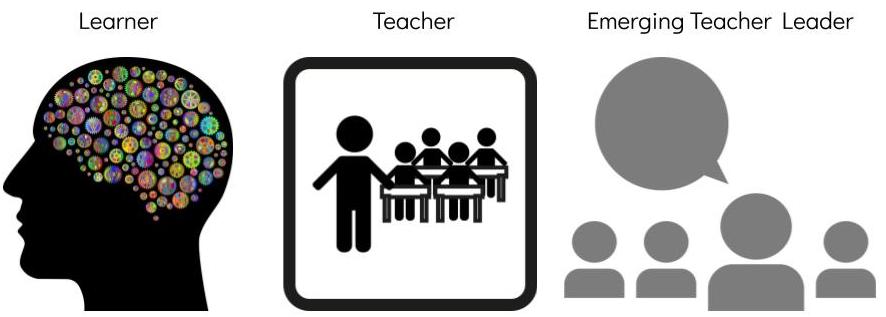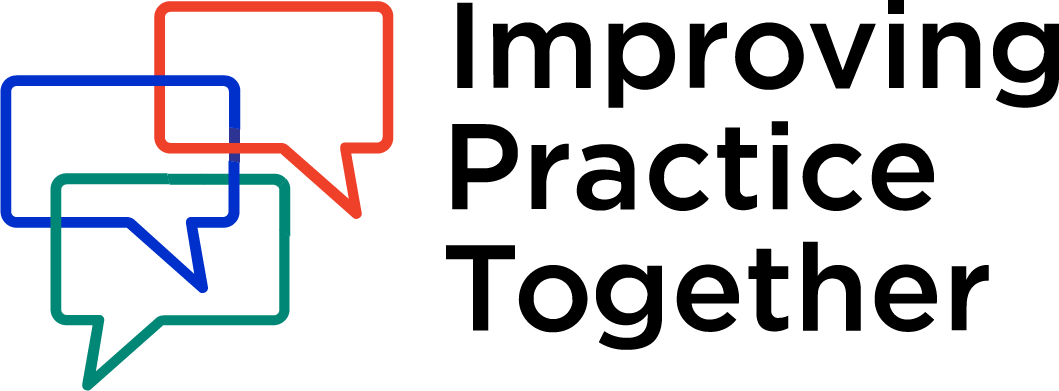Co-Constructing Professional Learning Experiences for Self and Others
Teacher leaders contribute to the process of developing professional learning experiences for themselves and their colleagues.
The Improving Practice Together project and approach rely on the foundation of a high capacity partnership that includes a school district with a dedicated science leader and an external professional learning partner. Using IPT resources to co-create professional learning experiences may require similar robust capacity.
Roles of Teacher Leaders:
During their initial professional learning experiences, teacher leaders participate in three different ways— as learners, teachers, and emerging teacher leaders.
- As learners, participants explore science phenomena and concepts that may be new to them. They also develop their own abilities to engage in argument from evidence and in the other science and engineering practices, such as modeling, and constructing explanations.
- As teachers, participants explore research about how people learn, the pedagogy that translates research into science teaching practice, how to use argumentation as a tool for learning across the subjects, and ways to include social emotional learning to ensure equity and inclusion.
- As emerging leaders, participants explore their own capabilities to lead professional learning experiences and to support their colleagues. They explore frameworks for adult learning, protocols for leading reflections on practice, and strategies for building collaboration and trust with their colleagues.
As teacher leaders co-construct professional learning experiences for their colleagues, they draw on what they learned and how they learned it in these three different roles.

Co-Constructing Professional Learning Experiences for Teacher Leaders (For Self)
Participating in professional learning experiences to improve their classroom practice supports teacher leaders to lead from within their own classrooms. The support that teacher leaders will need depends on the specific goals and priorities of the school or district, and the current leadership capabilities of the teacher leaders. Professional learning experiences for teacher leaders are most effective when they are co-constructed by professional learning partners, district leadership, and the teacher leaders. Co-construction offers the opportunity to design learning experiences tailored to meet teacher leaders where they are and to target specific outcomes.
How do you co-construct the teacher leadership development experience? Teacher leaders and the district science coordinator join the external professional learning partner to design the professional learning experiences for developing teacher leadership capacity. Here is an example of the process:
- Identify priorities. School district leaders, the science coordinator and teacher leaders identify current district priorities and the specific ways in which teacher leaders will be deployed. This information is discussed with the professional learning partner. In the case of IPT, the district priority is to promote discourse and argumentation.
- Gather data. Teacher leaders provide feedback through surveys, focus groups, or individual interviews. They identify their comfort level with different aspects of the science and argumentation content, and what they still need to feel confident leading their colleagues? Ideally, surveys are given after each professional learning experience so that it’s clear which topics teacher leaders feel they are making the most progress with and which ones are still a struggle. Data can be reviewed directly or synthesized by an evaluator.
- Use a framework. The professional learning partner shares frameworks and design templates they use to create the professional learning experiences for teacher leaders (Pedagogies of Practice and the Learning Cycle).
- Consider other data sources. District science coordinator and the professional learning partner each share perspectives on what the teacher leaders need in order to be successful, based on classroom observations, conversations with teachers and teacher leaders, and knowledge of the field.
- Begin planning the institute. The professional learning partner and district science coordinator synthesize what they have heard, create an outline of topics to be addressed in a leadership development institute, and share it back with the teacher leaders for feedback and iteration.
- Finalize the institute. The professional learning partner finalizes the goals and agenda for the leadership development institute and a plan for the transition of responsibility for the subsequent institute and follow-up sessions that will be co-led by teacher leaders.
Gradual release for Teacher Leaders

Gradual release for Science Coordinator

Co-Constructing Professional Learning Experiences for Teachers (For Others)
Once teacher leaders have engaged in the professional learning experiences themselves, i.e., summer institute, follow-up sessions, leadership development), they are invited to participate in redesigning those professional learning experiences for their colleagues. The amount and type of participation depends on each teacher leader’s own desires, capabilities, and availability. Some teacher leaders may give feedback on particular sessions. Others may delve deeper into the frameworks that guide the design and implementation of the professional learning experience. And some may offer suggestions and recommendations for different approaches they think are more aligned with their existing context. It is critical to listen to and engage in collaborative conversations with the teacher leaders in order to find the right balance between what is realistic to expect of teachers, the priorities of the district (e.g., improvement of science teaching and learning through argumentation), and the capability of the teacher leaders themselves.

How do you co-construct professional learning experiences for others?
Teacher leaders, the district science coordinator, and the external professional learning partner prepare for the design and implementation of the professional learning experiences the teachers leaders will lead for their colleagues–other teachers in the school district. Together they will produce resources (e.g., scripted sessions, slides, hand-outs, videos, etc.) that they and others can use to present future professional learning sessions. The goal for the teacher leaders is to feel prepared to lead sessions that are relevant and useful for their colleagues, and support the priorities of the district. To do this, the Professional Learning Team (professional learning partner, teacher leaders, and district science coordinator) agrees on the criteria for the revision and/or new design of the professional learning sessions; works in subgroups to revise or design and document resources, provides feedback on resources designed by other subgroups; and revises the resources. Here is an example of the process:
- Establish criteria: First, the Professional Learning Team surfaces any new criteria and constraints for the professional learning sessions. They consider changes to the goals of existing sessions, adding emphasis to certain focus areas, (e.g., equity, literacy integration, SEL, etc.), or creating entirely new sessions. The voices of teacher leaders are critical as they are closest to the needs and context of their colleagues.
- Provide feedback: The Professional Learning Team can divide up the existing sessions among subgroups to provide written feedback on what parts were effective and what parts might need to be changed or revised based on the new criteria. This process is facilitated by the professional learning partner.
- Synthesize the data: The Professional Learning Team team considers the written feedback on the session scripts together with the feedback the teacher leaders provided when they were participants (e.g., daily reflections from the sessions, surveys, interviews, focus groups, etc.), and comes to consensus on which sessions should be prioritized and what parts need to be revised. Sample feedback and agreements.
- Revise the sessions: The subgroups then revise the sessions.

